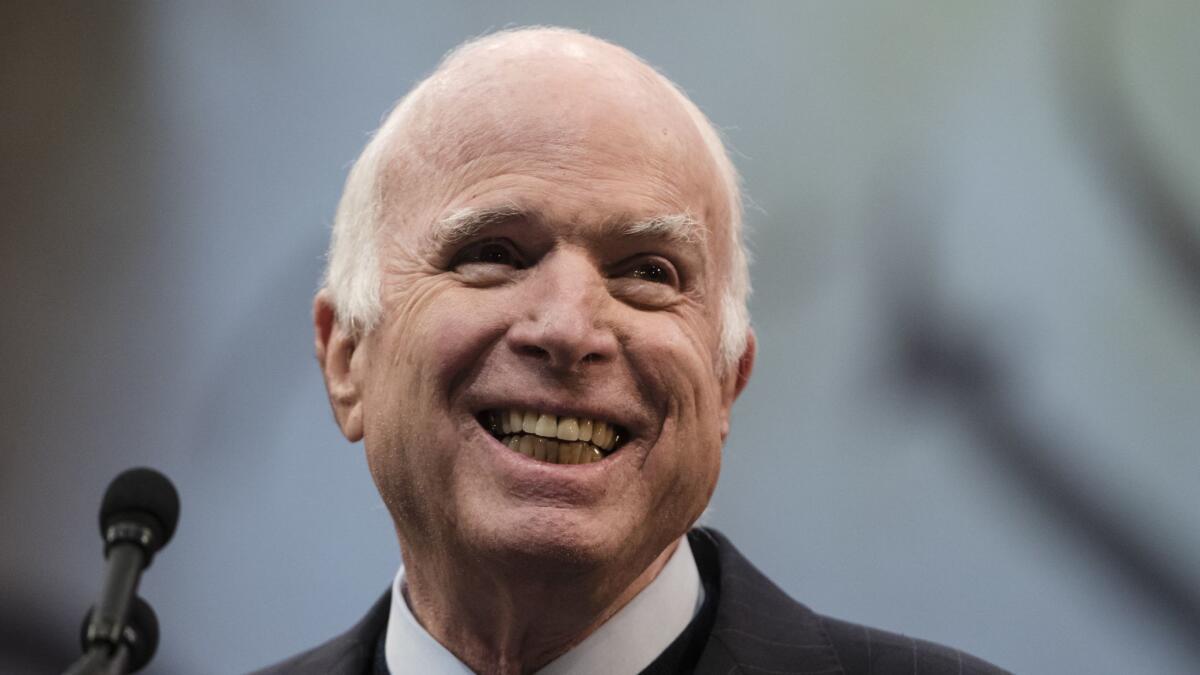Capitol Journal: Nostalgia for John McCain’s ‘straight talk’ in the age of Trump

- Share via
Reporting from Sacramento — John McCain’s “Straight Talk Express” rolled into Sacramento one day during the 2000 presidential race, and I climbed aboard. It was an unforgettable ride.
Here was this top-tier presidential candidate willing to sit with a group of reporters and answer their questions until they had none left. That was highly unusual.
McCain didn’t make news that day, but he did display his positive personality and dry wit. He was entertaining. It was fun. No temper flares.
The Arizona senator, then running in the California primary, stepped into the campaign bus at 7:15 a.m., filled a paper cup with coffee, avoided the doughnuts and headed to the rear. He took the middle seat in a horseshoe filled with reporters.
“I enjoyed my hours of sleep last night enormously,” he said. “Both of them.”
The candidate’s chartered plane had gotten stuck in the mud in Bremerton, Wash., delaying his flight four hours. He didn’t get to a Sacramento hotel until 3 a.m.
Someone asked why he was hanging out with pesky reporters instead of napping.
“Waiting for the opportunity to say something stupid in the next 45 minutes,” he replied.
This was his daily routine in 2000: holding court with reporters for hours. He considered it good strategy, but it drove his aides batty.
“I’ve complained he has no time to strategize and think,” McCain advisor Ken Khachigian told me back then. “He’s got reporters sitting there all the time asking anything they want to. He’s totally exposed.”
“It helps me to get my point of view out, my philosophy,” McCain told us. “And I enjoy it. I apologize for enjoying being around a group of communists and Trotskyites.”
By being open to the news media, McCain also was trying to polish his image that had been blemished by an influence-peddling scandal a decade earlier. He succeeded in that, but not his political candidacy. He lost the California primary to Texas Gov. George W. Bush — it wasn’t close — and the next day dropped out of the race.
Eight years later, McCain won the California primary over Mitt Romney and captured the GOP nomination, then lost to Democrat Barack Obama in November.
Unfortunately, McCain changed his campaign style from 2000 to 2008. He wasn’t nearly as open to the media.
Times political reporter Mark Barabak wrote in a McCain obit Sunday that the 2000 run “was a joyful, insurgent romp,” but the 2008 campaign was “a cheerless grind … a slog.”
Still, at no time did McCain ever consider reporters “enemies of the people.” In fact, I’ve never heard of any politician calling us that except President Trump.
This is what McCain told us on the bus about his treatment by the news media: “I tell ya, every time I’ve screwed up and I deserved it, I got it [in the news media]. When I don’t screw up, I don’t get it.”
McCain freely admitted when he screwed up, unlike most politicians, particularly Trump.
Trump is a bottom-feeder who forages off the lowest human instincts of hatred, bigotry and vengeance. The president’s own incivility and pettiness were on full display when he refused for two days after McCain died Saturday to issue a statement honoring the Vietnam War hero and resisted flying the White House flag at half-staff.
Of course, Trump shamefully once said he didn’t consider McCain, who survived 5½ years as a war prisoner, a hero because he was captured.
Coverage of California politics »
Contrast Trump’s bad manners with other recent presidents, especially Ronald Reagan, who would almost tear up at the sight of a military uniform.
Reagan didn’t hold grudges. Or if he did, he didn’t talk about it publicly. And he wasn’t a revenge-seeker.
In fact, unlike Trump, Reagan couldn’t bring himself to fire anyone.
“Nobody,” recalls his longtime political strategist, Stu Spencer. Nancy Reagan would orchestrate the firings herself, sometimes with Spencer’s help.
Instead of berating former opponents, Reagan would sometimes hire them.
Spencer was a prime example. After managing Reagan’s election for California governor in 1966, he became chief strategist for President Ford’s campaign in 1976. That angered the Reagan camp because the Californian jumped in against Ford and lost. But in 1980, Reagan hired Spencer back and won the presidency.
Spencer says Nancy Reagan called and asked him to meet her husband at the Los Angeles airport.
“I felt funny,” Spencer recalls. “But we just sat down and had a conversation. It was like picking up where we’d left off” before 1976.
An even better example: George H.W. Bush. Reagan made him vice president after the two were bitter rivals for the GOP nomination in 1980. Then Reagan hired Bush’s political guru, James A. Baker, as his White House chief of staff.
“Reagan put his feelings about Bush behind him in the best interests of himself and the Republican Party,” Spencer says.
Trump wouldn’t know his own best interests. If he did, he would have immediately ordered the White House flag lowered to half-staff and kept it there. And without hesitation he would have issued a formal statement — not a juvenile tweet — saluting a great American war hero and senator who could work with Republicans and Democrats alike.
McCain was eulogized in the California state Senate, run by Democrats.
“At this time we need [McCain-like] inspiration,” Senate leader Toni Atkins (D-San Diego) said. “Someone who reminds us we can step beyond our little boxes.”
We need another Straight Talk Express.
Follow @LATimesSkelton on Twitter
More to Read
Get the L.A. Times Politics newsletter
Deeply reported insights into legislation, politics and policy from Sacramento, Washington and beyond. In your inbox twice per week.
You may occasionally receive promotional content from the Los Angeles Times.











